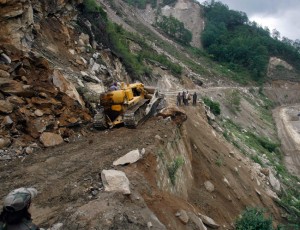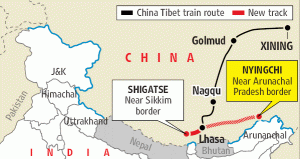China has announced plans to expand their recently opened railway line in Tibet. The high altitude line, which has connected Lhasa to Shigatse since August, will be extended by 402 kilometers to link Lhasa to Nyingchi, very close to the border of Arunchal Pradesh, the most north-eastern of India’s 29 states.
The new line, which will be used for both passenger and cargo transport, has an estimated cost of US $6 billion [£4.8 billion] and will take 7 years to complete.The railway will support passenger trains with speeds up to 160 km/hr, and will facilitate the movement of 10 million tons of cargo per year.
Arunachal Pradesh, a state sharing international borders with Bhutan, Myanmar, and Chinese-occupied Tibet, is an area over which the Indian and Chinese governments have ongoing border disputes. China claims Arunachal as part of the Tibetan Autonomous Region, calling it “Little Tibet”.
India Today reports that China and India have both been boosting development on their respective sides of this disputed area. The Indian government recently announced plans to set up 54 new border outposts as well as a Rs175 crore [US $2.8million; GB £1.8million] package for strengthening the infrastructure along the border in Arunachal Pradesh.
Reacting to this announcement, Chinese Defense Ministry spokesman Yang Yujin stressed the Chinese position that Arunchal Pradesh is a “disputed area,” and also said that India should “do more to maintain peace and stability in the area and not do things that may complicate the situation.” He continued, “Both sides should do more towards converging direction rather than contrary.”

A bulldozer clears a landslide on the Tezpur to Tawang highway, which runs to the Chinese-occupied Tibetan border in Arunachal Pradesh
Photo: Reuters
India’s efforts to upgrade roads in border areas have been slow-moving due to difficult terrain as well as a stagnation of overdue projects. Indian Prime Minister Narendra Modi’s government has pledged to speed up projects that are behind schedule.
Once a massive importer of rail technology, China now aims to be a world leader in high speed rail and is building, or is in talks to build or sell, high speed rail trains in at least 20 countries beyond its own borders.





 Print
Print Email
Email